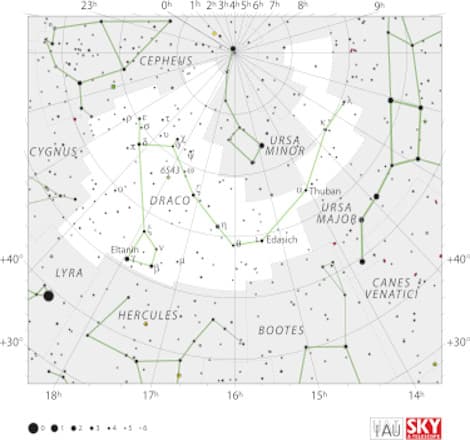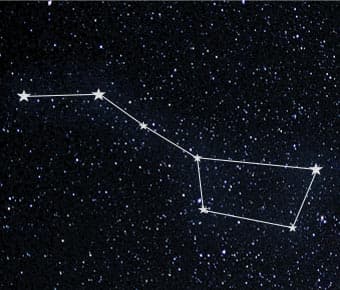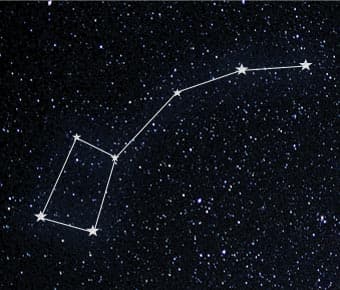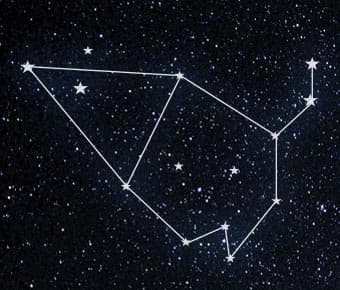From inspiring character names at Hogwarts to guarding golden apples, there are so many things to learn about the Draco constellation. You may already know it as the dragon constellation, but anything you don’t already we will have covered in this comprehensive constellation guide.
Get your scrolling finger at the ready and prepare to unearth Draco mythology, constellation facts about Draco’s stars and when to see Draco from the UK. Let’s go!
Fascinating Draco Mythology
The Draco constellation has been associated with different myths and therefore is said to represent different mythological figures. Yet, the constellation is most often depicted as a mythological dragon named Ladon. This dragon was a guard within the garden of the Hesperides and was responsible for protecting a tree of golden apples.
The tree of golden apples was a wedding gift to Hera after marrying Zeus. She asked the Hesperides to guard it for her but also placed Ladon beneath the tree to make sure the Hesperides would not touch the golden apples. Some variations of the myth have suggested that Ladon was not just a dragon but a half-woman-half-serpent creature with 100 heads.
As part of Heracles' 12 labours, he had to steal some of the golden apples and killed Ladon in the process. Hera was sad about the killing and placed Ladon in the sky in memory as the Draco constellation, more often referred to simply as the dragon constellation.

Source: Wikipedia
- Symbolism: the Dragon
- Right ascension: 17h
- Declination: +65°
- Quadrant:NQ3
- Area:1083 sq. deg. (8th)
- Main stars: 14
- Bayer/Flamsteed stars: 76
- Stars with planets: 19
- Brightest star: γ Dra
Looking at the Dragon Constellation
To see the dragon in the sky, you must first locate the constellation on a clear night. Help in achieving this can be found further down our guide. Once you have found the constellation, imaginary lines need to be drawn between each star in a certain way. This will give you an outline of the dragon’s form. However, this does not mean it will look like a dragon. To see the dragon that our ancestors saw, you will need to use some imagination to fill in the details. It also helps if you have an idea of what to look for. That is why we have provided an image of the Draco constellation below.
The Brightest Stars of the Draco Constellation
The brightest star of Draco is called Gamma Draconis or Etamin. But it also has a nickname. Some people call it the Zenith Star because it is directly above the zenith point above London. You can find Gamma Draconis easily if you already know where to find the Lyra constellation nearby. The brightest star in Lyra is Vega and just north-west of that star is Gamma Draconis. Other bright stars in the Draco constellation include:
- Eta Draconis
- Beta Draconis
- Delta Draconis
- Zeta Draconis
Location of Draco in the Sky
The Draco constellation covers 1083 square degrees of the Northern Hemisphere. Because of its huge size, it is in the top 10 largest star constellations. It sits in the third quadrant and is visible at latitudes between +90 and -15 degrees. This means you can see the Draco constellation from the UK.
Other constellations close to the dragon constellation are Cepheus, Hercules, Boötes, Ursa Major and Minor, Lyra and Camelopardalis. If you already know where any of these constellations are located, it will help you find Draco on your next stargazing trip.
Can You See Draco from the UK All Year?
Yes! The dragon constellation is visible in the UK skies all year long. But just because it is visible all year doesn't mean there isn't a prime time to go looking. Experts recommend seeking out Draco in July, which also means you can take a summer stargazing camping trip to find the dragon.
Just remember to plan your search for Draco on a clear night and get away from as much light pollution as possible. These things will improve your view of the Draco constellation.
How Far Is the Draco Constellation from Us?
The Draco constellation is not a single distance from us. All of the bright stars mentioned earlier, and Draco's other stars are different distances away.
For example, the brightest star of the constellation, Gamma Draconis, is around 155 light years away. This distance will change in the future and more info can be found below in our Draco bonus facts section. However, another star in the same constellation, Beta Draconis, is almost 400 light years away. This goes to show that – if it were possible - we could go to some of the stars in Draco and then back to Earth before we would have time to reach some of the constellation’s other stars.
Bonus Facts About the Dragon Constellation
Want to hear another myth associated with the Draco constellation? What about a famous character that was named after these stars? You can find the best bonus facts below.
- In Roman mythology, the constellation is associated with a different tale. Draco was a giant titan who fought with the Olympian Gods for a decade. Draco was killed in a battle and thrown into the sky near the north pole and froze in its place. Hence why the constellation is close to the North Pole star.
- Although you won't be around to see it, in one-and-a-half million years from today, the Gamma Draconis star will come closer to Earth and will be the brightest star visible from our planet.
- Draco Malfoy from Harry Potter is named after this constellation.
Ladon spent his life protecting a wedding present for Zeus and Hera. And Ladon can protect your own unique gift if you choose to name a star after someone in this area of the sky.
Naming a star after somebody is a fantastic gift and Star Name Registry can make it happen.
Learn about the process of naming a star on our site and find answers to common questions on our FAQ page.






